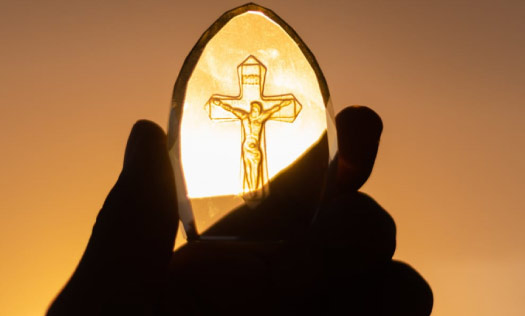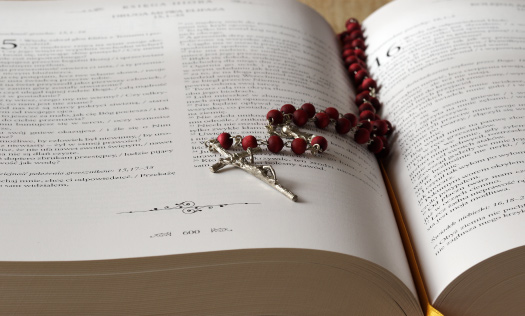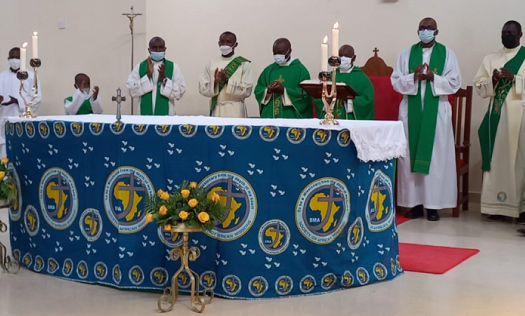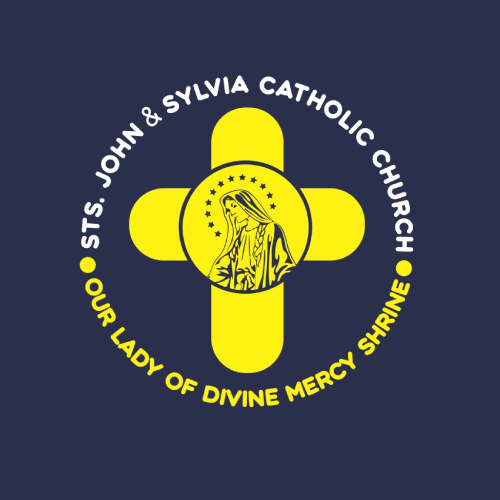The Catholic Faith
What is the Catholic Faith?
The core beliefs of the Catholic faith are found in the Nicene Creed. Here’s what it says:
- I believe in one God, the Father almighty, maker of heaven and earth, of all things visible and invisible.
- I believe in one Lord Jesus Christ, the Only Begotten Son of God, born of the Father before all ages. God from God, Light from Light, true God from true God, begotten, not made, consubstantial with the Father; through him all things were made. For us men and for our salvation he came down from heaven, and by the Holy Spirit was incarnate of the Virgin Mary, and became man. For our sake he was crucified under Pontius Pilate, he suffered death and was buried, and rose again on the third day in accordance with the Scriptures. He ascended into heaven and is seated at the right hand of the Father. He will come again in glory to judge the living and the dead and his kingdom will have no end.
- I believe in the Holy Spirit, the Lord, the giver of life, who proceeds from the Father and the Son, who with the Father and the Son is adored and glorified who has spoken through the prophets.
- I believe in one, holy, catholic and apostolic Church. I confess one Baptism for the forgiveness of sins and I look forward to the resurrection of the dead and the life of the world to come. Amen.
Why do we venerate Mary
The fact that Mary is called the Mother of God is at the heart of Roman Catholic devotion. Mary serves as a bridge between our broken humanity and the infinite divinity of the triune God. Mary is redeemed because she is human, but because she shares DNA with Christ, she is also thought to have a special and unique relationship with God. “She gave Jesus his body, and his body is what saved us,” Mother Teresa once said.
She is the saint of saints since she is the mother of the King of Kings. Additionally, because the church is Christ’s body and Mary is Christ’s mother, Mary is also the church’s mother. This means that, in addition to her relationship with Jesus, Mary has a unique relationship with the church.
We respect our mother and the mother of our Lord when we recite the rosary or bow our heads during the creed. Despite the fact that she is not God, she has won our admiration and devotion.
What are confessions sessions?
We confess our sins by speaking out our sins to a priest. “ He who confesses and forsakes them will obtain mercy” (Proverbs 28:13). We must confess all mortal sins committed after baptism. We keep the following factors to make a good confession:
I am not ashamed to confess my sins (Sirach 4:26)
I do not conceal any of my sins(Proverbs 28:13)
I do not postpone the day of my confession (Sirach 5:7)
I will not be self complacent of my sins(Sirach 5:4-6)
I will not accuse or blame God for my sins(Sirach 15:20)
Why is catechism important?
Catechism is religious instruction, usually in the form of questions and answers, that is used to teach the young, convert others, and testify to the faith. Catechism serves as a guide to better understanding the bible
Baptism
Congratulations on the arrival of your new baby! Sts. John and Sylvia, Our Lady of Divine Mercy Shrine join you in congratulating you for your new gift.
Baptism is the first sacrament celebrated in the process of becoming a full member in the Catholic Church. The waters of baptism symbolize life and death, washing and cleansing, and the mystery of new life out of death. At the baptism of a child (or any person), we celebrate and reflect on God’s unconditional love and welcome him or her into our faith.
Parents are the primary educators of their child/children. In celebrating the Rite of Baptism of Infants, parents publicly commit to forming their children in the life of faith.
Parents are addressed:
“Parents you have asked to have your child baptized. In doing so you are accepting the responsibility of training him/her in the practice of the faith. It will be your duty to bring him/her up to keep God’s commandments as Christ taught us, by loving God and neighbor.”
“Parents have a right and duty to be intimately involved in preparing their children for First Communion. Catechesis aims to help parents grow in their understanding and appreciation of the Eucharist and participate readily in the catechizing of their children. Parish or school programs of religious formation assist parents in this most important responsibility but never usurp the rightful role of parents.
Infant Baptism
Before your child is baptized the following requirements need to be fulfilled.
- Your child must be under 5 years.
- The parent must belong to a Jumuiya within the church
- The parents and the child must attend the preparation classes as advised by the cathechist.
- A Godparent must be a confirmed Catholic, practicing catholic faith, and be willing to accept the responsibility of supporting their godchild in faith
For any clarification please contact our church office that is open daily over the weekdays and on Sunday.
Reconciliation

The Sacrament of Reconciliation, also called Confession, allows us to confess our sins, receive absolution and be reconciled with the Church. Reconciliation must be received before First Communion (Eucharist)
First Holy Communion

Holy Matrimony

The Sacrament of Marriage, or Holy Matrimony, is a public sign that one gives oneself totally to this other person. It is also a public statement about God: the loving union of husband and wife speaks of family values and also God’s values.
Requirements for Holy Matrimony
- For Catholic couples, baptism and confirmation certificates. For mixed marriage, please consult with the catechist.
- Attend couple counseling classes with Father incharge and the catechist
- Certificate from registrar of marriage
Confirmation
The sacrament of confirmation completes the sacrament of baptism. If baptism is the sacrament of re-birth to a new and supernatural life, confir- mation is the sacrament of maturity and coming of age. The real confession of Christ consists in this ‘that the whole man submits himself to Truth, in the judgment of his understanding, in the submission of his will and in the consecration of his whole power of love. To do this, poor-spirited man is only able when he has been confirmed by God’s grace.
Anointing of the Sick

Anointing of the Sick, is a sacrament that is administered to give strength and comfort to the ill and to mystically unite their suffering with that of Christ during his Passion and death.
This sacrament can be given to those who are afflicted with serious illness or injury, those who are awaiting surgery, the weakened elderly, or to ill children who are old enough to understand its significance. A person can receive the sacrament as many times as needed throughout their life, and a person with a chronic illness might be anointed again if the disease worsens.
The rite can be performed in a home or hospital by a priest, who prays over the person and anoints their head and hands with chrism (holy oil).
The priest may also administer the sacrament of the Eucharist if the person has been unable to receive it and can hear a confession if so desired. If a person is at the point of death, the priest also administers a special Apostolic blessing in what is known as the Last Rites.
Please the Parish priest if you are in need of this sacrament or know of anyone who has been unable to receive the sacrament of anointing the sick.
Holy Orders

The Sacrament of Holy Orders is the continuation of Jesus Christ’s priesthood, which He bestowed upon His Apostles. This is why the Catechism of the Catholic Church refers to the Sacrament of Holy Orders as “the sacrament of apostolic ministry.”
“Ordination” comes from the Latin word ordinatio, which means to incorporate someone into an order. In the Sacrament of Holy Orders, a man is incorporated into the priesthood of Christ at one of three levels: the episcopate, the priesthood, or the diaconate.
Downloads
Catechism serves as a guide to better understand the bible.
Contact Us
Location - Acacia area in Kitengela opposite Olerai Hotel.
Call: 0706240233
info@stsjohnandsylviakitengela.org
Subscribe
Get the Latest updates of news, events and communications.
Quick Links
Sacraments & Statement of Faith
Our Leadership
Small Christian Communities (SCC)
Our Ministries
Catholic Diocese of Ngong
DONATE
NCBA Bank - KITENGELA BRANCH
1957480017
Reference (sadaka, building fund, education fund)
MPESA
PAYBILL 4042525
Account Name (your intention eg. Sadaka, Zaka)
